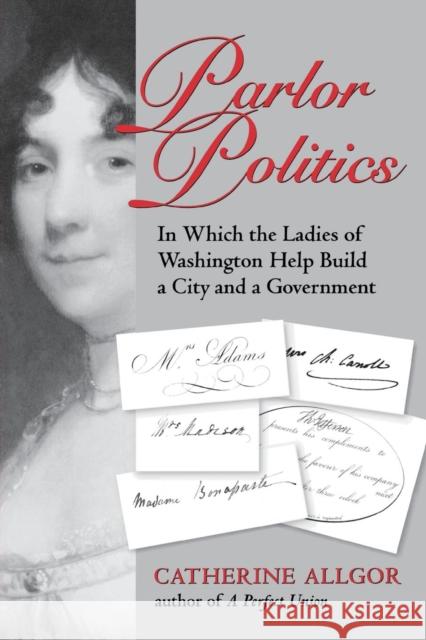Parlor Politics: In Which the Ladies of Washington Help Build a City and a Government » książka
Parlor Politics: In Which the Ladies of Washington Help Build a City and a Government
ISBN-13: 9780813921181 / Angielski / Miękka / 2002 / 312 str.
Parlor Politics: In Which the Ladies of Washington Help Build a City and a Government
ISBN-13: 9780813921181 / Angielski / Miękka / 2002 / 312 str.
(netto: 102,15 VAT: 5%)
Najniższa cena z 30 dni: 106,83
ok. 22 dni roboczych.
Darmowa dostawa!
When Thomas Jefferson moved his victorious Republican administration into the new capital city in 1801, one of his first acts was to abolish any formal receptions, except on New Year's Day and the Fourth of July. His successful campaign for the presidency had been partially founded on the idea that his Federalist enemies had assumed dangerously aristocratic trappings--a sword for George Washington and a raised dais for Martha when she received people at social occasions--in the first capital cities of New York and Philadelphia. When the ladies of Washington City, determined to have their own salon, arrived en masse at the president's house, Jefferson met them in riding clothes, expressing surprise at their presence. His deep suspicion of any occasion that resembled a European court caused a major problem, however: without the face-to-face relationships and networks of interest created in society, the American experiment in government could not function.Into this conundrum, writes Catherine Allgor, stepped women like Dolley Madison and Louisa Catherine Adams, women of political families who used the unofficial, social sphere to cement the relationships that politics needed to work. Not only did they create a space in which politics was effectively conducted; their efforts legitimated the new republic and the new capital in the eyes of European nations, whose representatives scoffed at the city's few amenities and desolate setting. Covered by the prescriptions of their gender, Washington women engaged in the dirty business of politics, which allowed their husbands to retain their republican purity.Constrained by the cultural taboos on "petticoat politicking," women rarely wrote forthrightly about their ambitions and plans, preferring to cast their political work as an extension of virtuous family roles. But by analyzing their correspondence, gossip events, "etiquette wars," and the material culture that surrounded them, Allgor finds that these women acted with conscious political intent. In the days before organized political parties, the social machine built by these early federal women helped to ease the transition from a failed republican experiment to a burgeoning democracy.
"Parlor Politics is a stimulating, lively, and subtle book that enlarges our understanding of how, in just half a century, Washington City became an important world capital."- Alan Pell Crawford · Wall Street Journal"For those whose knowledge of early Washington and its politics is in need of repair, Parlor Politics provides a fresh perspective and rich details- history at its most readable."- Jeff Sharlet · Washington Post"What Ms. Allgors history suggests is that the nation that dares to criticize its first ladys fashion sense may be a very healthy one indeed."- Emily Eakin · New York Times"In this scholarly yet animated and thought-provoking analysis, Allgor presents her groundbreaking research on the critical role that women played in the early days of Washington politics.... Allgor... combines excellent research, which draws on primary archival material, with a flair for expressive writing."- Publishers Weekly, *starred review"An extraordinary piece of work, easily one of the most intellectually original and stylishly elegant first books I have ever read. Allgors treatment of the role of women brings them into the center of the story of Americas early political history and demonstrates that the republican values so central to the ideology of the post-Revolutionary era actually required the presence of women to permit the federal government to function. Its the kind of argument that seems utterly self-evident but in fact no one has made it before in anything like this persuasive way. Throughout the text, one encounters a truly lyrical presence, cajoling, whispering, taking us aside (as at an elegant dinner party) to talk interestingly about what the evidence means."- Joseph J. Ellis, author of Founding Brothers: The Revolutionary Generation and American Sphinx: The Character of Thomas Jefferson"Parlor Politics is an absolute gem of historical research and writing. Again and again-and yet again-it opens fresh views on the political culture of the early Republic. Moreover, its sprightly, sparkling prose will delight scholars and general readers alike."- John Demos, Yale University, author of The Unredeemed Captive: A Family Story from Early America"Parlor Politics is cultural history at its best. Showing how style and substance merged into social power, Catherine Allgor has recovered the fascinating political role of women in the Washington of Jefferson and his successors."- Joyce Appleby, author of Inheriting the Revolution: The First Generation of Americans











